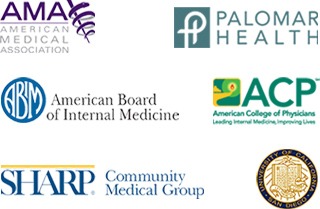New patient? Start here
Begin by downloading our New Patient Forms, so you’re ready for your visit.
General medicine deals with the diagnosis and “non-surgical” treatment of diseases, usually involving your internal organs. Prevention, diagnosis, and the treatment of adult diseases are all part of this medical specialty. Physical examinations as well as diagnostic tests are the hallmark of general medicine and are included in the diagnosis and treatment of patients.
Following is a partial list of the general medicine issues that Dr. Salada addresses:
Having an annual physical goes a long way to ensure your overall good health and wellness. Consider it to be an important preventative to catching and treating problems before they become serious ones. Annual physicals will involve monitoring of your “vitals” such as blood pressure, cholesterol levels, and weight, to name a few.
The electrocardiogram is a test the checks for problems with the electrical activity of the heart. It is used to find the cause of chest pain and/or pressure, to determine the cause of other symptoms such as shortness of breath or dizziness that may indicate cardiac problems.
Blood pressure readings should be taken over the course of 3 or more office visits to get an accurate assessment of your average blood pressure. This will then determine the type of treatment, if any, that you may require.
Laboratory screening tests are used to detect and identify diseases in their earliest and most treatable stages. Examples include cholesterol testing, glucose testing for diabetes, and urine tests for the presence of urinary tract infections.
Diagnostic scans such as the DEXA for bone density and the colonoscopy used to detect colon cancer and other diseases of the bowel, are important as preventative measures as well as being used as diagnostic tools.
There is no other primary care facility that I would ever think of going to. I am blessed to be a patient here!
In addition to writing prescriptions for patients to have filled at local pharmacies, a healthcare professional can also directly dispense drugs to patients through in-office dispensing programs.
Blood glucose monitoring is essential to controlling diabetes. Many factors can result in changes to blood glucose levels, so it’s important to work with a physician to learn what can cause it to rise or fall and how to prevent diabetes complications.
Hypertension or high blood pressure can eventually result in health problems such as heart attacks and strokes. It can be controlled using a combination of medication, diet, and exercise.
A variety of illnesses can affect the liver including cirrhosis, hepatitis, fatty liver disease, and hemochromatosis. Certain drugs taken in excess can cause liver disease.
After a thorough physical workup it often becomes necessary for a patient to be referred to a specialist, such as a cardiologist or neurologist, who is better trained and equipped to deal with his or her particular health issue.
Begin by downloading our New Patient Forms, so you’re ready for your visit.
Need to pay your bill? Do it from the comfort of your home.
Visit with your health care provider from the comfort of your home.


